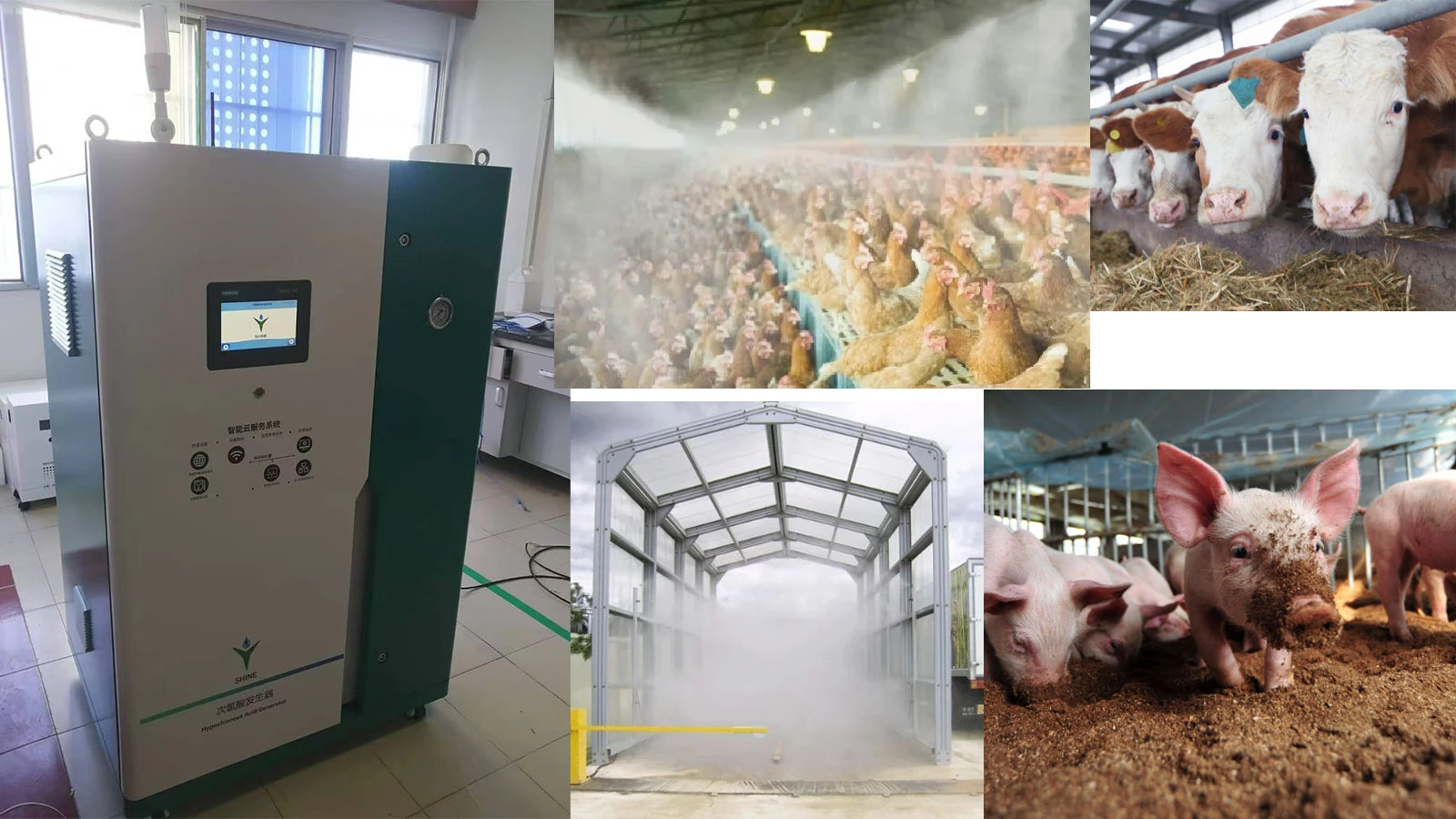The challenges of livestock production and the importance of disinfection
At present, animal husbandry is facing many severe challenges under the trend of scale intensification and high density feeding. The complexity of pathogens is becoming increasingly prominent. Because a large number of livestock and poultry are concentrated in a relatively small space. A variety of bacteria, viruses and parasites and other pathogens can spread and multiply rapidly. These pathogens are not only diverse. But also prone to mutation, which makes the prevention and control of diseases significantly more difficult.
The spread of the disease is so fast that once it breaks out, it can often spread to the entire farm in a short time, bringing huge economic losses to farmers. In this context, the importance of disinfection is self-evident.
Second, hypochlorous acid has significant advantages in animal husbandry
(1) High efficiency and broad spectrum sterilization ability
Hypochlorous acid has a powerful and efficient broad-spectrum bactericidal ability. Which can quickly and effectively kill a variety of pathogens in animal husbandry. It has significant killing effect on common bacteria, such as Escherichia coli, Staphylococcus aureus, and avian influenza virus. According to experimental data, the bactericidal efficiency of hypochlorous acid (HClO) is about 80 times higher than that of hypochlorite (ClO-). It can effectively penetrate the membrane of the pathogen, oxidize the cell protein, nucleic acid and enzyme from the inside, so as to achieve the purpose of rapid killing.
(2) Outstanding safety features
Hypochlorous acid has outstanding safety characteristics in animal husbandry. First of all, it is non-irritating to animals and will not cause discomfort or adverse reactions to animals. For breeding personnel, exposure to hypochlorous acid will not cause harm to the body, safe and reliable. At the same time, hypochlorous acid has no residue after use, will not accumulate in the breeding environment or the animal body, is not toxic to the environment, will not cause environmental pollution.
(3) Significant economic value
Hypochlorous acid has significant economic value in animal husbandry. On the one hand, it can reduce the cost of breeding. Compared with the traditional disinfection method, the use of hypochlorous acid is relatively low cost, and the effect is remarkable. At the same time, hypochlorous acid can reduce the use of antibiotics. Meanwhile, reducing the cost and potential risks caused by antibiotic use. On the other hand, by effectively preventing the occurrence of epidemics, animal death and production performance decline caused by epidemics are avoide, thus reducing economic losses.
Third, independent research and development of electrolytic cells and complete solutions
(A) Independent research and development of electrolytic cell excellent performance
Our self-developed electrolyzer has many excellent properties. First of all, its warranty period of up to 10,000 hours. Which fully demonstrates the durability and reliability of the product. Secondly, the operation is efficient and stable, and can continue to produce high-quality hypochlorous acid solution to meet the large and continuous disinfection needs in livestock breeding.
(B) Comprehensive solutions provided
We offer comprehensive disinfection solutions for livestock production. In terms of breeding environment, professional spray equipment and hypochlorous acid solution with appropriate concentration are use to disinfect livestock and poultry houses in a full range, effectively removing odor and killing germs. For vehicles and people, set up a strict disinfection process to ensure that vehicles and people entering the farm do not bring pathogens. In the disinfection of drinking water pipeline, the amount of hypochlorous acid solution is accurately controll, the formation of biofilm is inhibit, and the safety of drinking water for animals is ensure.
(C) It has been exported to many countries
Our products have been successfully export to the United States, Britain, South Africa, Spain, Mexico and other more than 40 countries. In the field of animal husbandry in these countries, we have accumulated rich application cases and practical experience. For example, in a large farm in the United States, after using our products, the incidence of disease on the farm was significantly reduce and the economic efficiency was greatly improve. In South Africa, our solutions help farmers effectively deal with the challenges of complex farming environments and pathogens. These success stories fully demonstrate the applicability and effectiveness of our products and solutions on a global scale.

